Buyer’s Guide to the Best Content Marketing Books of 2018

If you’re looking for a holiday gift book to advance the recipient’s content marketing skills, I have good news. During 2018, authors and publishers created some of the most helpful and sophisticated content marketing books.
I speak from review experience, as I’ve been sharing the plusses and minuses of content marketing books since 2012. Books published in 2018 tended to have better designed covers and short, punchy titles coupled with longer subtitles that described the benefits to readers. In addition, some acclaimed authors returned with new books.
Drivers of content marketing
As in previous years, this year’s roundup focuses on the latest ideas and techniques for increasing conversions. The most effective formula for increasing profits and sales continued to involve increasing the size of your newsletter’s mailing list by offering first-time visitors ethical bribes or content bonuses in exchange for signing up to receive the firm’s email newsletter.
In 2018, content marketers renewed attention to the why’s and how’s of brand storytelling techniques, almost as if storytelling didn’t exist until January 1, 2018.
As in previous years, many of the best books originated in the growing field of neuroscience – applied brain research. Thanks to authors such as Dan Ariely, we know readers’ brains are highly selective. Messages are filtered for relevance in real time.
In 2019, the most important driver of content marketing will remain neuropsychology, but with an interesting twist – using classic narrative story formats for sharing brand mission and customer.
Bottom line: Whether you’re looking for a book to help you reinvent your content marketing or a gift for someone who realizes they need a fresh approach, the shelves are filled with options. Here are some of the best options published in 2018 (and, in one case, the closing months of 2017).
Make Blue Ocean Shift the first step in reinvention
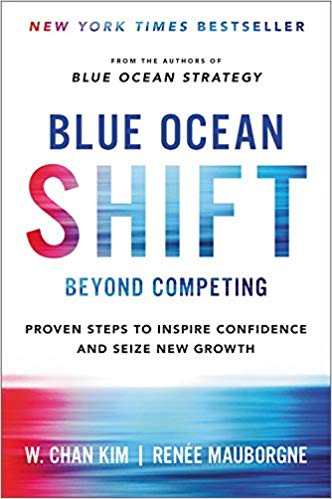
Blue Ocean Shift: Beyond Competing – Proven Steps to Inspire Confidence and Seize New Growth
W. Chan Kim and Renee Mauborgne
If someone is contemplating a major marketing change, Blue Ocean Shift is an ideal choice. It’s a road map based on the authors’ 30 years of consulting and researching the path to smoother, more successful reinventions.
Thinking about a major #marketing change? The book #BlueOceanShift is a must-read, says @RogerCParker.
Click To Tweet
The Blue Ocean Shift helps readers identify and answer the foundational questions before proceeding further. The authors characterize two marketplace types:
- Red oceans are traditional, highly competitive markets. They are usually no-growth markets filled with hungry businesses competing primarily on price. Red refers to the color of the waters, reflecting the traditional warfare that has entered a new era of violence.
- Blue oceans offer a welcome alternative. They are unexplored and untainted by competition. Blue oceans are vast, deep, and powerful in terms of opportunity and growth. A Blue Ocean Shift emphasizes creating new demand in uncontested market space rather than fighting over a shrinking profit pool.
Just as a map (or GPS system) spells success for a cross-country drive, your team’s answers to the questions posed in Blue Ocean Shift can spell the difference between a successful or unsuccessful reinvention. Blue Ocean Shift details the how’s and the why’s of each step as a reinvention project moves forward. I was particularly impressed by the authors’ description of the steps involved when dealing with members of the various reinvention teams.
The authors emphasize respecting the feelings of everyone involved, while going into great detail for each step. Nothing is left to chance. They even include sample scripts for team leaders to follow during group question-and-answer sessions.
Profit from your most effective and least expensive marketing tool

Talk Triggers: The Complete Guide to Creating Customers with Word of Mouth
Jay Baer and Daniel Lemin
The first time I heard about Talk Triggers was an email announcement Jay sent in which he said it was his “best book.”
“Aha,” I said. “We’ll see about that!”
After I read it, I agreed he was right. It is not only an excellent book about an often overlooked aspect of content marketing, but the book itself is a great example to help anyone write an excellent how-to book.
#TalkTriggers is a great example to help anyone writing a how-to book, says @RogerCParker. #contentmarketing
Click To Tweet
I was excited to hear that Jay and Daniel wrote a book about word-of-mouth advertising. During the 1990s and early 2000s, working as advertising manager of a fast-growing retail store, I was frustrated by the disconnect between the reality of how we dealt with customers in the store and the owners’ ambivalence about taking the high road and featuring satisfied-customer stories.
My enthusiasm for Talk Triggers is based on three things:
- Simple organization. Its structure takes the pain out of reading a complex topic. The authors have spent considerable time organizing the information in a logical format. As a result, chapters are relatively short and appear in a logical order.
- Detailed advice. As someone who appreciates the power of word-of-mouth advertising, I was impressed by the depth of information. The authors detail the planning of a strategic “Talk Trigger” campaign and clearly describe how to spread talk triggers throughout the organization. This topic has never been addressed with such detail.
- Enthusiasm. The authors describe a strategic campaign, permitting you to learn details that might not be appropriate for broader media, particularly Section Four, Create Talk Triggers in Six Steps, and Chapter 18, Amplify Your Talk Trigger.
Not only does Talk Triggers address a crucially important topic, Jay and Daniel present a model that can teach and inspire the next generation of authors as well. The design and simple graphics are especially appropriate at communicating context without overwhelming adjacent text.
Get your story read and remembered, a step-by-step guide
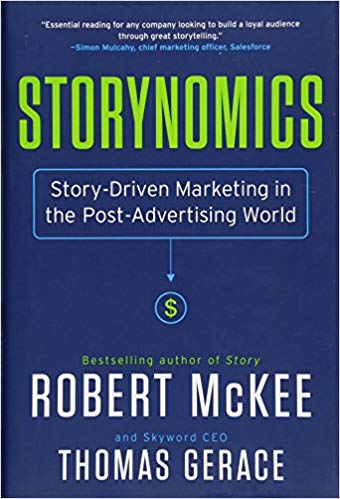
Storynomics: Story Driven Marketing in the Post-Advertising World
Robert McKee and Thomas Gerace
“As with the weather, everybody has an opinion, but nobody does anything about it.”
Luckily, however, there’s Robert. He’s a distinguished educator who has devoted his career to sharing the power of story in Hollywood, corporate board rooms, and conferences/workshops. And, luckily, his writing partner Tom is head of one of the most respected and successful content agencies in the world, Skyword. Together, they have written the first practical book about storytelling that offers step-by-step guidance that simplifies a complex process and topic.
#Storynomics offers step-by-step guidance and simplifies the complex process of storytelling. @RogerCParker
Click To Tweet
Most books about writing begin with a discussion of Joseph Campbell’s hero journey, a description of the underlying pattern behind most fables, published fiction, and movies. Now, there’s nothing wrong with Campbell’s story and its diagrams of action and reaction except that it often distracts from the current author’s original purpose. I often buy a book titled, A Busy Executive’s Guide to Business Writing (a hypothetical title) and suddenly realize I’m reading a different book, an abstract and theoretical one.
When I found Storynomics’ brief introduction titled The Marketing Crisis, I think, “Good! The authors speak my language.” And I proceeded to read Chapter 1, Advertising: A Story of Addiction. Addiction and advertising fascinate me. They’re more relevant to me than cavemen telling stories around a campfire. Soon, it was daybreak and I was still reading Storynomics.
All first-class books have a step-by-step process, and Storynomics is no exception. It goes through eight stages of storytelling, from the target audience and subject matter, to the inciting incident and objective of desired, followed by the first action, reaction, and the crises choice and closure. The concluding section, Putting Story to Work, contains chapters each addressing a process for each stage.
Resurrect the forgotten lessons
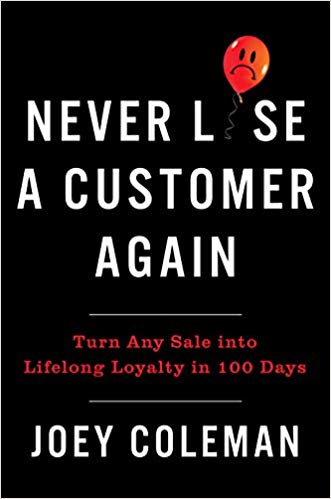
Never Lose a Customer Again. Turn Any Sale into Lifelong Loyalty in 100 Days
Joey Coleman
The minute I discovered Never Lose a Customer Again, I decided to feature it in the best content marketing books of 2018. It’s not just another customer retention book. It’s a long-needed step-by-step guide or “partner book” that can be paired with implementation books focusing on specific platforms or techniques.
Like Blue Ocean Shift, Never Lose a Customer Again would make a great companion with Jay Baer and Daniel Lemin’s Talk Triggers. It would also make a logical companion to any of the books in the mini review later in this article.
Its provenance is impeccable. Author Joey Coleman has built his international career helping clients reduce customer loss, which undermines most businesses ranging from startups to major brands like Deloitte, Hyatt Hotels, Zappos, and NASA. He helps clients create memorable experiences so emotionally powerful they cause lapsed members to renew their memberships, baseball fans to renew their commitment to a lagging team, and users of personal computers to upgrade their software.
In Never Lose a Customer Again, Joey starts by redefining customer experience and emphasizes how it differs from customer service.
Customer experience & customer service are 2 separate things. @thejoeycoleman #NeverLoseaCustomerAgain
Click To Tweet
Customer service refers to, he writes, the “assistance and advice provided by a company to those people who buy or use its products or services.”
Customer experience accounts for emotion. “Customer experience encompasses the emotions a customer feels when they interact with a product or service. When that experience goes beyond what the product or service is supposed to deliver, the customers feel like they have a great experience and become emotionally involved with the brand,” Joey writes.
But, when things go wrong, customer emotion can quickly turn against the business. He continues: “Customer experience, on the other hand, comes on the front end. It anticipates what might go wrong and structures the interactions to avoid this from ever happening. Customer experience is proactive. It’s the environment, the feeling, and the scenario a business creates for the customer to trigger a series of desired emotions.”
The book’s subtitle, Turn Any Sale into Lifelong Loyalty in 100 Days, comes from Joey’s decades of observations working with clients wise enough to look for a structured program to follow the sale. They are wise enough to understand that their company’s future depends on what happens in the first 100 days. As Joey writes, “From the very onset of the relationship, a clock starts ticking and every interaction, touchpoint, exchange, and communication contributes to their overall perception of your company.”
Joey’s 100-day methodology, described in Never Lose a Customer Again, is so powerful that, in most cases, his clients’ competition simply can’t match or outperform it.
Follow your instincts, not best practices
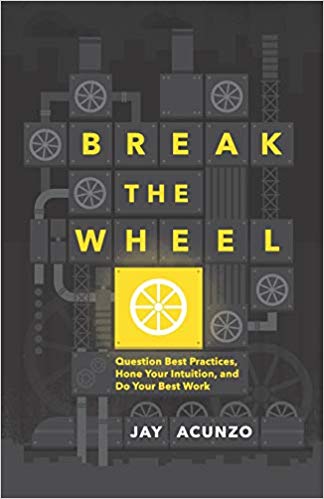 Break The Wheel: Question Best Practices, Hone Your Intuition, and Do Your Best Work
Break The Wheel: Question Best Practices, Hone Your Intuition, and Do Your Best Work
Jay Acunzo
Jay is a master rising-star keynote speaker at marketing conferences around the world. But, if you meet him after one of his dynamic presentations, resist the urge to tell him about your Ultimate Underground Guide to Blogging or Your 10 Best Ways to Put SEO in Its Place.
If you’re familiar with Jay’s Unthinkable.fm podcasts or his high-energy keynote presentations at Content Marketing World, you know that Jay doesn’t particularly like formulaic marketing – mindlessly coming up with copy-and-pasted quick solutions like 10 tips, 20 shortcuts, or – in his words– “Oh, well, you get the idea.”
In fact, he has several things to say about supposedly creative people who look for “expert advice” and “proven, step-by-step directions.” Though those ideas worked in the past, they may not work in the future. He fears for the future of a large marketing segment that lacks the “all-in” creative drive of mavericks who trust their intuition.
Of course, as shown by the dismal survey responses that marketers submit each year, management is frequently driven by costs rather than responsive to fresh creative approaches.
For the last four years, on his podcast Jay has been interviewing entrepreneurs who prospered greatly by following their intuition instead of relying on group-think. He shares those stories, like a third-generation headphone manufacturer in Brooklyn, a coffee vendor who used the wrong type of coffee beans, or an encyclopedia editor who dared to introduce humor into serious discussions.
In Break the Wheel, Jay’s first (of many, hopefully) book, he has mined transcripts of his podcast interviews with self-directed individuals (“confident mavericks”) who have found great success and satisfaction defying the experts and their conventional wisdom.
If you listen to Jay’s podcasts, Break the Wheel offers an extra level of understanding. If you’re not a listener, you’re in for treat. You not only have new experts to learn from, but a wealth of valuable ideas.
Podcast takeaways include Jay’s sense of humor. You’ll enjoy Jay’s wordplay. You’ll probably find yourself laughing while listening. (Jay’s sense of humor is, well, eclectic.)
Content marketing should be more challenging and more fun. Content creators should push themselves to higher levels of accomplishment, serving as role models for newcomers. Work environments should become “test centers.” And, as Thomas Edison said, failures should be celebrated as “lessons learned.”
Author your first book
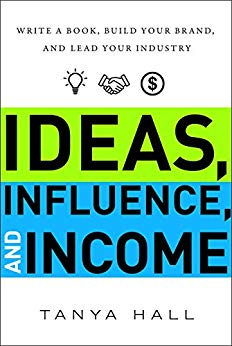
Ideas, Influence, and Income: Write a Book, Build Your Brand, and Lead Your Industry
Tanya Hall
The desire to write a book is nearly universal, but until now, there has not been a book to share how to do that in an up-to-date, objective manner with real-world, simplified options.
For decades, Tanya worked with one of the most respected literary agents at a leading agency that has lasting relationships with top non-fiction authors. She’s closely followed the self-publishing trend and currently monitors what she refers to as “hybrid publishing.” She also is an accomplished writer who knows her territory, as well as the strengths and weaknesses of authors.
Ideas, Influence, and Income is ideal for content marketers who have been waiting for a high-level perspective on publishing options and resources. It reads like a conversation with a knowledgeable publishing expert who has prepared for the interview and wants to see new authors treated fairly and with dignity.
The book doesn’t detail unrealistic promises about how quickly readers should expect to finish writing their book or how much money authors can expect to make from sales. It doesn’t offer a “painless, proven formula” for writing a book in a weekend, in three weeks, or 90 days.
It describes why authors should embrace book marketing as enthusiastically as they embrace writing their book. It also respects new authors’ feelings and concerns, such as about not being able to finish their book. It’s a good choice for anybody who has had that notion to write a book.
More worthy gift books
In contrast to the previously described books that focus on foundations and drivers of content marketing, the following books focus on narrower topics. As such, they make ideal companions for the above books. In many cases, printed copies are available for less than $10.
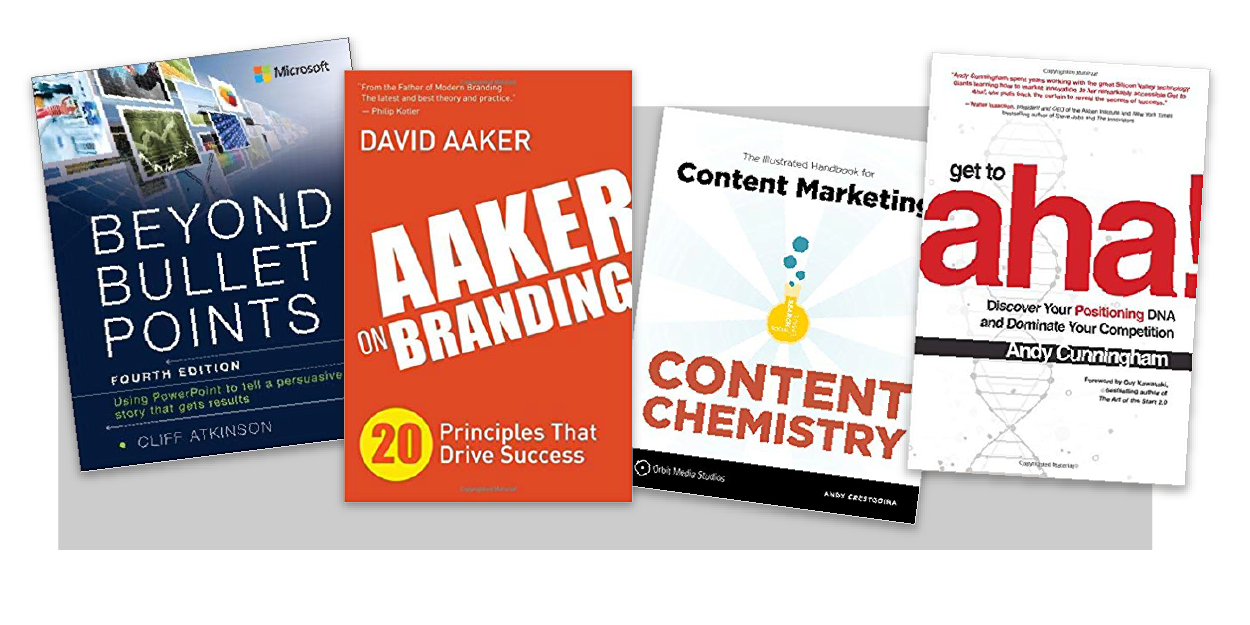 Aaker on Branding: 20 Principles that Drive Success
Aaker on Branding: 20 Principles that Drive Success
David Aaker
Although he resides in Australia, David’s books reflect a deep understanding of the challenges facing American marketers. The subtitle of his latest book pays homage to the impatience of American marketers who are not so much looking for “creative” solutions as they are impatiently searching for practical advice they can easily understand and implement.
Beyond Bullet Points: Using PowerPoint to tell a Persuasive Story that Gets Results, Fourth Edition
Cliff Atkinson
You might think PowerPoint is past its prime, but you’d be wrong. As Cliff shows, there is a continuing need for compelling SlideShare presentations that can be shared on LinkedIn as well as on your website. Cliff also shows how to use PowerPoint’s Notes feature as a planning tool for video courses.
Content Chemistry: The Illustrated Handbook for Content Marketing, Fifth Edition.
Andy Crestodina
Each edition is better than the last. Though the information is updated, Andy’s distinctive style remains consistent. The letter-size format and page design set new standards of readability. Andy has a broader perspective than most authors, so he is at home discussing different aspects of web design from multiple perspectives, such as SEO, social media, etc.
Get to Aha! Discover Your Positioning DNA and Dominate Your Competition
Andy Cunningham
Written from the perspective of a leading Silicon Valley participant – Andy worked with Apple’s Steve Jobs introducing updated Macintosh computers – Get to Aha! outlines a detailed process for agencies to adopt as they become increasingly committed to content marketing. This is a superb story that marketing teams in large corporations will increasingly appreciate.
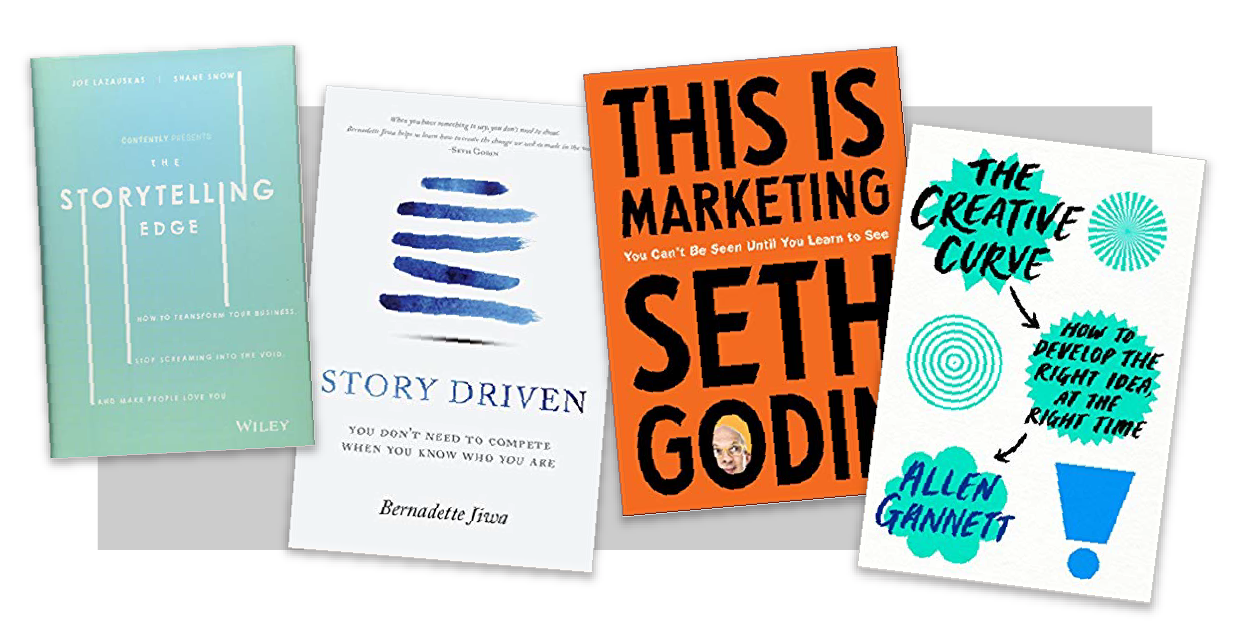
The Creative Cure: How to Develop the Right Idea at the Right Time
Allen Gannett
This is one of the best creativity books I’ve found. For example, how can two studies of a marketing topic come to totally conflicting conclusions? Allen tells the story of Paul McCartney’s Yesterday, which the former Beatle wrote in a few hours. But it took two years to get the orchestration right. Why? People want new creations, new songs, etc., but they don’t want something totally different. They wanted something new with recognizable carryovers.
This Is Marketing: You Can’t be Seen Until You Learn to See
Seth Godin
This is Marketing is a compilation of Seth Godin’s latest blog posts on the constantly changing marketing scene. Part inspiration, part advocate, there are probably more useful ideas in This is Marketing than in the curriculum of many a business school. Seth is impatient with overly complex marketing solutions and the slow pace of change. He’s Silicon Valley savvy but wants to see more businesses use proven marketing techniques. Having offline access to his latest thinking is wonderful.
Story Driven: You Don’t Need to Compete When You Know Who You Are
Bernadette Jiwa
Throughout the year, Bernadette compiles her recent blog posts into a series of small-format, 5¼- by 8-inch books. Bernadette’s writing is as concise as her mentor Seth Godin’s. Her latest print book, Story Driven, is among her best. It’s beautifully written and designed for easy reading.
Contently Presents The Storytelling Edge: How to Transform Your Business, Stop Screaming Into the Void, and Make People Love You
Joe Lazauskas and Shane Snow
Contently is an agency specializing in brand storytelling for content marketing clients. The Storytelling Edge outlines how it has built storytelling into its workflow, and how you can do the same in your firm. It’s a slim hardcover book with lots of stories you can relate to.
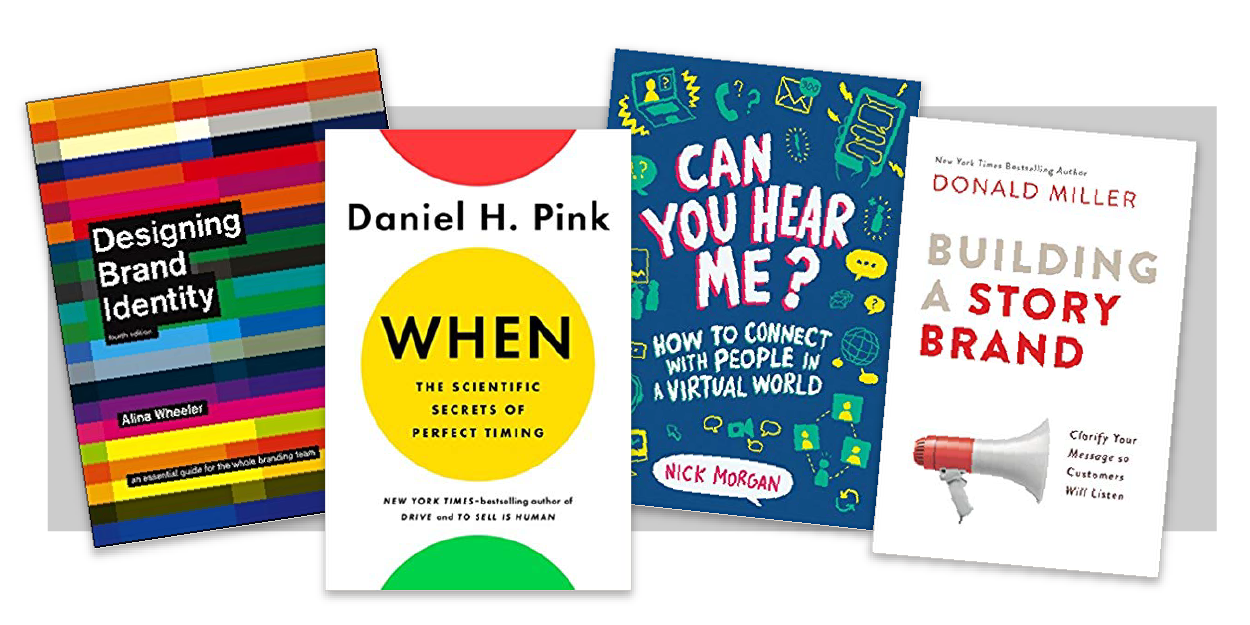
Building a Story Brand: Clarify Your Message So Customers Will Listen
Donald Miller
This is yet another story of how an agency committed to content marketing, and how it is building close ties with clients committed to a new way of doing things – a content-driven approach. One of the advantages of working with larger clients is a greater likelihood they have internal staff resources to participate in the process, which adds efficiency. One of the best parts of Building a Story Brand is the emphasis on positioning your business as a guide.
Can You Hear Me? How to Connect with People in a Virtual World
Nick Morgan
Nick is one of the most respected coaches for A-list keynote speakers. He is a frequent guest commentator on CNN and other channels after presidential debates. His latest book analyzes the pros and cons of virtual meetings and presentations. He is frustrated by the limited bandwidth of most offerings because they filter out many of the vocal cues that permit participants in face-to-face meetings to accurately judge how others are responding to spoken words. He shows how speakers can compensate for the limitations that electronic solutions offer.
When: The Scientific Secrets of Perfect Timing
Daniel H. Pink
Dan’s latest book explores the chronobiologic and other research on the interaction between the brain, time, and moods. Telephone calls in the morning, for example, are usually upbeat. But, as the day goes by, calls get shorter and more negative. His research has already resulted in time-oriented books like Chip and Dan Heath’s The Power of Moments, which explains the importance of defining moments in our lives.
Designing Brand Identity: An Essential Guide for the Whole Branding Team
Alina Wheeler
Designing Brand Identity is a large, letter-size format compendium of design and copy techniques. Each branding asset is described on a two-page spread. Usually, the resource is defined on the left page with relevant illustrations on the right. The result is a highly visual catalog of branding options.
Choose the right gift book
 When you shop for holiday gift books for content marketers, do your research. Amazon.com permits you to view the table of contents and sample one or more chapters. If the book is available in Kindle format, you can download samples.
When you shop for holiday gift books for content marketers, do your research. Amazon.com permits you to view the table of contents and sample one or more chapters. If the book is available in Kindle format, you can download samples.
You also can print and complete several copies of my Reader Preference Worksheet. Don’t forget to save it so you can use it for gifts for that person later in the year too. (And fill one out for yourself too.)
Now it’s your turn. Have you read any of the books in this guide? What did you think? And what books should be added to the 2018 list? Please share in the comments.
Take your (or your gift recipient’s) content marketing education even further. Enroll in the winter semester of Content Marketing University.
Cover image by Joseph Kalinowski/Content Marketing Institute
The post Buyer’s Guide to the Best Content Marketing Books of 2018 appeared first on Content Marketing Institute.
from Content Marketing Institute http://bit.ly/2LyLyg0
via IFTTT





Leave a Comment